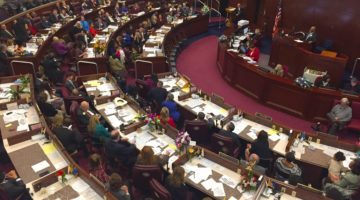Nevada’s minimum wage could be getting a boost this year. That’s after two bills were introduced in the state legislature this month that aim to raise, or even double, the wage for the state’s lowest paid workers.
Assembly Bill 175, sponsored by Assemblyman William McCurdy II, D-Las Vegas, would raise the minimum wage by $1.25 per hour, per year, until it reaches $15 by 2022. Senate Bill 106, sponsored by the Committee on Commerce, Labor and Energy, would increase the minimum wage by 75 cents each year for 5 years or until the minimum wage reaches $12 or more.
Both bills were introduced in committees last week and sparked spirited conversations between the committee members and the public.
Advocates for SB 106 and raising the minimum wage argued on Monday in the Senate Committee on Commerce and Labor that the current Nevada minimum wage of $8.25 per hour is a poverty wage.
“Currently, a single parent of two working an $8.25 per hour minimum wage job does not even meet the federal government’s own measure of the poverty line, which is $20,160 a year,” said state Sen. Yvanna Cancela, D-Las Vegas.
Cancela introduced the bill on Monday, Feb. 20, with Senate Majority Leader Aaron Ford, D-Las Vegas.
“As a state, we have not made any significant changes to our minimum wage rates in nearly a decade,” Cancela said in her introduction. “In 2006 voters approved a minimum wage amendment in the Nevada Constitution that asked that the minimum wage be calculated based on the federal minimum wage and the cost of living. Currently, the minimum wage is $8.25 an hour or $7.25 an hour if an employer offers qualified health benefits.”
Cancela also said an increase in the minimum wage would increase Nevada’s economy by stimulating consumer demand.
Diana Diaz has worked as a cashier at a McDonald’s in Las Vegas for almost 3 years and testified in favor of SB 106 last Monday.
“I shouldn’t have to ask for help because I work very hard and the company I work for makes 5 billion dollars in profit yearly,” Diaz said. “I help them make the profit, I am always living on the edge of being homeless again.”
Jackson Brainard, a fiscal and policy analyst with the National Conference of State Legislatures, testified to the senate committee saying that 32 states and Puerto Rico have pledged an increase in minimum wage requirements other than the ones that had previously existed.
Those testifying against the bill, for the most part, were owners of small businesses concerned that the increase in the minimum wage would put them out of business.
Robert Buckle is an owner of three sandwich shops in Las Vegas and said if the SB 106 passed, all three of his shops would go out of business.
Bonnie McDonald is another small business owner in Las Vegas and said because she has negotiated her employee’s wages she has been able to avoid laying off a single employee.
“I must tell you that I am really scared if this goes into effect, if the minimum wage goes up to $12 or $15 like you’re proposing, I have no shot to keep my doors open,” said Gino Ferraro, an owner of an Italian restaurant in Las Vegas.
Ferraro said his concern is that he would have to pay his servers and other employees that make $70,000 to $80,000 a year a higher minimum wage since there is no tip credit in Nevada.
Taking small businesses’ concerns into consideration, Ford said they are considering an amendment to change the effect date of the minimum wage requirement in order to give businesses sufficient time to plan for the increase.
“We believe that increasing the minimum wage gradually over five years by 75 cents a year is a fair balance between allowing small businesses and businesses to continue to grow and allowing their employees to begin to earn a living wage,” Ford said.
Ford said it is about finding a balance between paying workers a living wage and allowing small businesses to keep their doors open.
Both Assembly Bill 175 and SB 106 will be read, discussed again and voted on in committee meetings in the coming weeks.












